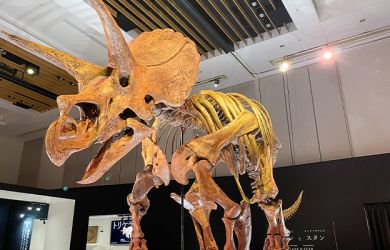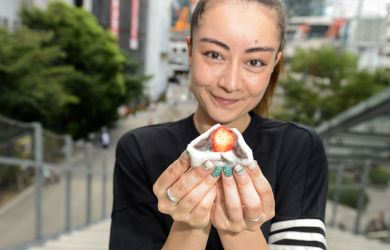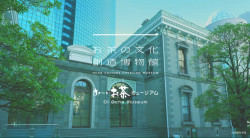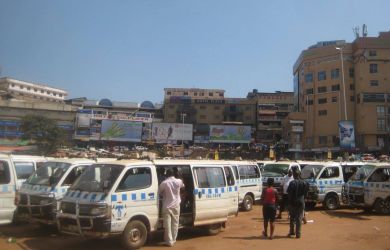
April 6, 2006
Little Journeys, Big Delights
From bugs to butts, Tokyo's less visited museums have something for everyone
By Metropolis
Originally published on metropolis.co.jp on April 2006
What do parasites, cigarette lighters, earthquakes and eyeglasses have in common? Absolutely nothing, unless you are browsing Tokyo’s overlooked little museums.
The city’s affinity for eccentricity breathes life into the normally dry realm of museum collections. If you’ve been in this city long enough, chances are you’ve completed the museum circuit around Ueno Park and had a close encounter with the spaceship hovering above Ryogoku, known to earthlings as the Edo-Tokyo Museum. But what about less publicized niche exhibits? Even locals may look puzzled if stopped for directions to the Imperial Confectionery or Safe & Key Museum. Sumida-ku alone is a treasure trove of 23 small workshops for traditional crafts like dolls, tortoiseshell products and tabi (split-toe socks). More industrial if not unusual interests are represented with shinkansen brakes and rubber baseballs.
Exploring Tokyo’s more obscure cultural storehouses is quick, affordable and easy-to-do. Breeze through each in less than 45 minutes. If not free, entrance to any among this hand-picked selection costs ¥400 or less, and most are in central Tokyo. So ditch your guidebook, and lace up those museum-hopping shoes. Here’s an itinerary sure to entertain even the Edokko who has seen everything.

Photos by Jeffrey Tanenhaus
I’m still not sure what sodium chloride has to do with smoking, but given the frequency with which the Japanese light up, this place is certainly at home in Tokyo.
Salt, however, is overshadowed at this heavily smoking-oriented museum. Browse finely crafted smoking implements and accessories from tobacco jars to ornate cigarette cases. Displays of smoking in kabuki and tobacco culture in the Meiji era hearken back to when lighting up was an art form, not a bad habit.
Japanese advertising enlivens the walls.
I was aesthetically drawn to Peacock brand, a poster for which features a smoking horse with wings. Find your favorite packs from around the world and throughout the decades.
Explanations are in Japanese only, but product graphics and the pipe collection make this a worthwhile visit, even for the non-smoking set. Not recommended for those on the patch. 1-16-8 Jinnan, Shibuya-ku. Tel: 03-3476-2041. Open Tue-Sun 10am-6pm. Nearest stn: Shibuya. Admission: ¥100.
Looking for another nicotine-related rush? Try the Lighter Museum, dedicated to a cigarette’s best friend. 1-27-6 3F, Mukojima, Sumida-ku. No phone. Open daily 10am-6:30pm. (Closed on the fifth Sunday of a month.) Nearest stn: Honjo-Azumabashi. Admission: free.

Walking into this cozy museum felt like a flashback to a more colorful but similarly crowded version of grandma’s attic, just without the smell… and without so many kites. From floor to (low) ceiling, more than 3,000 kites cover every available surface, stuffed into corners and overlaying display cases. Watch where you walk.
Incarnations include everything under the sun: kabuki actors, famous battle scenes, monsters, dragons, birds, butterflies, even action heroes. It doesn’t take long to get a flavor for this popular Japanese pastime. Yet the cramped quarters housing such radiant, lofty toys give off an animals-trapped-in-the-zoo vibe. 5F Taimeiken Bldg, 1-12-10 Nihombashi, Chuo-ku. 03-3271-2465. Mon-Sat 11am-5pm. Nearest stn: Nihonbashi, exit C5. Admission: ¥200.
If kites lift your spirits, head for the four-story Huge Kite Museum in Saitama. 637 Nishi-Hojubana, Kasukabe-shi, Saitama-ken. Tel: 048-748-1555. Open daily 9am-4:30pm (closed the second and fourth Monday of the month). Nearest stn: Minami-Sakurai (Tobu-Noda line), then a 25-minute taxi ride. Admission: ¥300.

Get wired at an information-packed retrospective of Japan Post, NTT, NHK and the advancement of technology behind them through hands-on exhibits.
Somali stamps. Postage from Pitcairn. Philatelists will have a field day browsing 290,000 global varieties. Japan’s display also features old postcards. Brush up on the history of cancellation marks, visit a recreated Meiji post office, or test your skill as a mail carrier on a scooter simulation.
Phones literally ring off the hook in NTT’s science of telecommunication hall. Tokyo’s last manual switchboard is presented almost nostalgically, as is a 1951 “pillow phonebook” 10cm thick. Chameleon green payphones were once pink, red, turquoise and transparent. Pagers and car phones make you appreciate how the keitai has also rendered obsolete pine trees strung with telegraph wires, once more expedient than fashioning poles.
Unless you understand Japanese, NHK’s broadcasting hall isn’t so interesting, although the stunning 100-inch digital Hi-Vision TV needs no translation. 2-3-1 Otemachi, Chiyoda-ku. Tel: 03-3244-6811. Open Tue-Sun 9am-4:30pm. Nearest stn: Otemachi. Admission: ¥110.
Communicate further at the NHK Museum of Broadcasting. 2-1-1 Atago, Minato-ku. Tel: 03-5400-6900. Open Tue-Sun 9:30am-4:30pm. Nearest stn: Kamiyacho. Admission: free.
Three mini-museums share one big basement. Easily the most interesting (and perverse) is the Criminality Museum. A history of “torture and judgment” underscores the “maim first, ask questions later” philosophy of Edo-era Tokyo police. Precious illustrations of Edo’s cruel and unusual punishments include stone holding, rope suspension and ebizeme—“prawn torture,” where feet are tied to the head. “It is assumed that some made false confessions from extreme pain,” reads a plaque with dry understatement. I’m glad Japan’s judicial system has evolved from when stealing 10 ryo was enough to face decapitation, saw cutting, crucifixion or burning at the stake. Don’t miss the iron maiden or, the most anachronistic exhibit of all, a chastity belt.
The adjacent Archeology Museum unearths Paleolithic implements from Kanto settlements, Jomon pottery and Chinese Han Dynasty bronze “mirrors.” The Commodity Museum outlines production techniques for Japanese craft-making. B1 Academy Common, 1-1 Kanda-Surugadai, Chiyoda-ku. Tel: 03-3296-4433. Open daily (except Aug 10-16 and Dec 26-Jan 7) 10am-4:30pm. Nearest stn: Ochanomizu. Admission: Free.
If you’re keen on criminality, try the Police Museum. 3-5-1 Kyobashi, Chuo-ku. 03-3581-4321. Tue-Sun 10am-6pm. Kyobashi stn, exit 2. Admission: free.

Dawn breaks as a mechanical cat meows from a tenement roof, where laundry hangs out to dry. Travel back to an Edo shitamachi community with a dozen life-size wooden replicas of houses and shops along the river. No details are spared in this loving nineteenth century recreation, down to weathered nails and a dog relieving himself on the fire tower.
Fading sunlight and sound effects (a wailing vendor, running water) mimic a typical day in the Tokyo of yore. Decorations change seasonally. During summer thundershowers, take shelter while browsing for radishes or pounding rice with your foot.
Kids can scamper down alleys with creaking wooden walkways, and try their hand at serving plastic tempura from a street stall. 1-3-28 Shirakawa, Koto-ku. Tel: 03-3630-8625. Open daily 9:30am-5pm (closed the second and fourth Monday). Nearest stn: Kiyosumi-Shirakawa. Admission: ¥300.
If fire-prone Tokyo sparks an interest, try the Shitamachi Museum. 2-1 Ueno Koen, Taito-ku. Tel: 03-3823-7451. Open Tue-Sun 9:30am-4:30pm. Nearest stn: Ueno. Admission: ¥300.

Sake savvy—or don’t know shinshu from genshu? At first glance, 1,000 empty bottles lining the walls aren’t much to entice visitors. But ask for the two informative English brochures, linger over samples, and stumble out a connoisseur. Staff happily dispense their favorites, whether it’s five cups of traditional blends (¥525), or three of sweet, sparkling or dry varieties (¥315). There’s enough selection to imbibe all afternoon, and an assortment of glasses for sale. 1-1-21 Nishi-Shinbashi, Minato-ku. Tel: 03-3519-2091. Open Mon-Fri 10am-6pm. Nearest stn: Toranomon. Admission: Free.
Want hops with your sake? Try the Beer Museum at Yebisu Garden Place. 4-20-1 Ebisu, Shibuya-ku. Tel: 03-5423-7255. Open Tue-Sun 10am-6pm (last entry 5pm). Nearest stn: Ebisu. Admission: free.

All aboard for planes, JR trains and automobiles. Japan’s first airplane, steam locomotive and automated traffic signal are enshrined at this mecca of transportation. Unique vehicles like a three-wheel 1964 Mazda pickup and a cutaway of a Datsun Sunny are parked upstairs. Trace bicycle and Japanese bus evolution—the former arising from the aptly named “bone shaker” (1860s). For first-class comfort, kick back in an old JAL fuselage where retro stewardesses smile from behind Plexiglas (call button unfortunately disabled).
This being Japan, however, trains steal the show. A working rail yard cannot compete with the diversity of endless exhibits here. Even if you’re no trolley jolly, it’s hard not to be swept away by Japan’s rail culture, which for some is a religion. Take rush hour into your own hands, and virtually steer a variety of JR trains. Operate automatic doors and a pantograph (rooftop tram arm), or relax in a Taisho-era third class carriage.
Perched on daddy’s shoulders, children marvel at model trains snaking through a miniature city illuminated with platform lights and flashing signals. The orange Chuo line chugs rather slowly. Another “accident” on the tracks, perhaps? 1-25 Kanda-Sudacho, Chiyoda-ku. Tel: 03-3251-8481. Open Tue-Sun 9:30am-5pm. Nearest stn: Akihabara. Admission: ¥310.
Like your trains running underground? Try the Subway Museum. 6-3-1 Higashi-Kasai, Edogawa-ku. Tel: 03-3878-5011. Open Tue-Sun 10am-5pm. Nearest stn: Kasai. Admission: ¥210.
Escape the madding crowds with a retreat to the airy and artsy studio of Japan’s father of modern sculpture. Realistic bronze statues of women and animals are the hallmark of Fumio Asakura (1883-1964). His noted series of cats is particularly kawaii.
The grounds are as delightful as Asakura’s sculptures. His mansion fuses the best of both worlds, with Western-and Japanese-style sections. Semi-furnished tatami rooms overlook a courtyard pond filled with natural spring water, lazy carp and rocks symbolizing Confucian precepts. Tokyo suddenly feels very far away, even from the rooftop garden. 7-18-10 Yanaka, Taito-ku. Tel: 03-3821-4549. Open Tue-Thu and Sat-Sun 9:30am-4:30pm. Nearest stn: Nippori. Admission: ¥400.
If you like pioneering Japanese artists, step inside the Basho Museum on the site once home to master Edo haiku poet Matsuo Basho. 1-6-3 Tokiwa, Koto-ku. Tel: 03-3631-1448. Open Tue-Sun 9:30am-5pm. Nearest stn: Morishita. Admission: ¥100.
A timepiece forever stopped at two minutes to noon is one of the everyday objects transformed into powerful reminders of the incendiary Great Kanto Earthquake and World War II air raids. Melted coins, distorted glass bottles, charred typewriters and a headless bust take on twisted dimensions at this dual memorial museum. Labels are in Japanese, but photographs and artifacts effectively recount the devastation. Apocalyptic renditions of the events by local painters hang on the second floor. Printing machines, a car chassis and a torpedo rust in peace in the adjacent open-air gallery, which feels sculptural yet sobering.
The museum is set in a city park with a towering memorial hall. Inside, walls are lined with chilling wartime photos of helpless citizens in a burning city reduced to rubble. Another nearby memorial is fitting to the enshrining of ashes. After the 7.9-magnitude quake, 38,000 residents fled to this vacant lot only for flames to follow, turning the evacuation area into an incinerator. 2-3-25 Yokoami, Sumida-ku. Tel: 03-3622-1200. Open Tue-Sun 9am-4:30pm. Nearest stn: Ryogoku. Admission: free.
To investigate techniques used to battle blazes past and present, dispatch yourself to the Fire Museum. 3-10 Yotsuya, Shinjuku-ku. Tel: 03-3353-9119. Open Tues-Sun 9:30am-5pm. Nearest stn: Yotsuya Sanchome. Admission: free.
It’s the world’s only museum devoted to what you might have unwittingly consumed during last night’s dinner (hopefully not a cousin of the 8.8-meter monster tapeworm showcased).
Worm your way through 300 species encased in blue jars. Photos of testicular elephantiasis and a light-up map of tropical disease distribution are sure to spoil any appetite. Or perhaps kindle romance? Yes, the museum is known to attract couples where a squeamish date can cuddle up in protective arms. What’s next? Weddings at Ueno Zoo?
Don’t forget the gift shop for “Wonderful World of the Worm” souvenir T-shirts and postcards. 4-1-1 Shimo-Meguro, Meguro-ku. 03-3716-1264. Tue-Sun 10am-5pm. Nearest stn: Meguro, west exit. Admission: free.
Thought you’ve seen ’em all? Here are some more funky museums in which to while away a rainy afternoon:
Bullet trains and F1 racing cars grind to a halt at the Brake Museum (03-3632-6931).
The Button Museum (03-3864-6537) features those fashioned from precious materials, some dating back 200 years.
A lens crafting workshop from the 1800s and antique frames are the focus of the Eyeglass Museum (03-3496-3315).
Attend workshops on making postcards from recycled milk cartons at the Paper Museum (03-3916-2320).
The Portable Folding Screen Museum (03-3622-4470) leaves no ambiguity over its collection.
A misnomer for sure, the Rainbow Sewer Museum (03-5564-2458) is for die-hard sanitation fans only.
Sixty-eight photos of yokozuna hang like a fleshy family tree at the Sumo Museum (03-3622-0366).
The Tabi Museum (03-3631-0092) satisfies those with a traditional footwear fetish.
Elementary school children brighten up Nihonbashi station at Tokyo Metro Junior Museum (03-3837-7544).
Note for museum lovers: Last admission is often 30 minutes prior to closing. When a holiday falls on Monday, museums may remain open and instead close Tuesday. Most museums close from Dec 28-Jan 4. Call ahead to avoid unforeseen closures, such as for exhibit changes.







